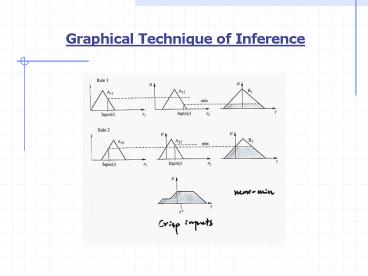Graphical Technique of Inference - PowerPoint PPT Presentation
1 / 35
Title:
Graphical Technique of Inference
Description:
Graphical ... Graphical Inference Method showing membership propagation and ... Graphical approach can give solutions very close to those using ... – PowerPoint PPT presentation
Number of Views:198
Avg rating:3.0/5.0
Title: Graphical Technique of Inference
1
Graphical Technique of Inference
2
Graphical Technique of Inference
Using max-product (or correlation product)
implication technique, aggregated output for r
rules would be
3
Graphical Technique of Inference
Case 3 input(i) and input(j) are fuzzy variables
4
Graphical Technique of Inference
Case 4 input(I) and input(j) are fuzzy,
inference using correlation product
5
Graphical Technique of Inference
6
Fuzzy Nonlinear Simulation
Virtually all physical processes in the real
world are nonlinear.
7
Approximate Reasoning or Interpolative Reasoning
8
Fuzzy Relation Equations
9
Fuzzy Relation Equations
10
Fuzzy Relation Equations
11
Partitioning
How to partition the input and output spaces
(universes of discourse) into fuzzy sets? 1.
prototype categorization 2. degree of
similarity 3. degree similarity as
distance Case 1 derive a class of membership
functions for each variable. Case 2 create
partitions that are fuzzy singletons (fuzzy
sets with only one element having a nonzero
membership)
12
Partitioning
13
Partitioning
14
Nonlinear Simulation using Fuzzy Rule-Based System
15
Nonlinear Simulation using Fuzzy Rule-Based System
This model may also involve Spline functions to
represent the output instead of crisp singletons.
16
Nonlinear Simulation using Fuzzy Rule-Based System
3. Input conditions are crisp sets and output is
fuzzy set or fuzzy relation The output can be
defuzzied.
17
Nonlinear Simulation using Fuzzy Rule-Based System
4. Input fuzzy Output singleton or functions.
If fi is linear Quasi-linear fuzzy model (QLFM)
Quasi-nonlinear fuzzy model (QNFM)
18
Nonlinear Simulation using Fuzzy Rule-Based System
19
Nonlinear Simulation using Fuzzy Rule-Based System
20
Fuzzy Associative Memories (FAMs)
A fuzzy system with n non-interactive inputs and
a single output. Each input universe of
discourse, x1, x2, , xn is partitioned into k
fuzzy partitions The total of possible rules
governing this system is given by l kn or l
(k1)n Actual number r ltlt 1. r actual of
rules If x1 is partitioned into k1 partitions
x2 is partitioned into k2 partitions
.
xn is partitioned into kn partitions l k1 ?
k2 ? ? kn
21
Fuzzy Associative Memories (FAMs)
Example for n 2
A ? A1 ? A7 B ? B1 ? B5 Output C ? C1 ? C4
22
Fuzzy Associative Memories (FAMs)
Example Non-linear membership function y 10
sin x
23
Fuzzy Associative Memories (FAMs)
- Few simple rules for y 10 sin x
- IF x1 is Z or P B, THEN y is z.
- IF x1 is PS, THEN y is PB.
- IF x1 is z or N B, THEN y is z
- IF x1 is NS, THEN y is NB
- FAM for the four simple rules
24
Fuzzy Associative Memories (FAMs)
Graphical Inference Method showing membership
propagation and defuzzification
25
Fuzzy Associative Memories (FAMs)
26
Fuzzy Associative Memories (FAMs)
Defuzzified results for simulation of y 10 sin
x1 select value with maximum absolute value in
each column.
27
Fuzzy Associative Memories (FAMs)
- More rules would result in a close fit to the
function. - Comparing with results using extension principle
- Let
- x1 Z or PB
- x1 PS
- x1 Z or NB
- x1 NS
- Let B -10,-8,-6,-4,-2,0,2,4,6,8,10
28
Fuzzy Associative Memories (FAMs)
To determine the mapping, we look at the inverse
of y f(x1) i.e. x1 f-1(y) in the table
29
Fuzzy Associative Memories (FAMs)
For rule1, x1 Z or PB
Graphical approach can give solutions very close
to those using extension principle
30
Fuzzy Decision Making
31
Fuzzy Ordering
Given two fuzzy numbers I and J
32
Fuzzy Ordering
It can be extended to the more general case of
many fuzzy sets
33
Fuzzy Ordering
34
Fuzzy Ordering
35
Fuzzy Ordering
This function is a measurement of membership
value of choosing x over y. If set A contains
more variables A x1,x2,,xn A
x1,x2,,xi-1,xi1,,xn Note here, A is not
complement. f(xi A) minf(xi x1),f(xi
x2),,f(xi xi-1),f(xi xi1),,f(xi
xn) Note f(xixi) 1 then f(xiA)
f(xiA) We can form a matrix C to rank many fuzzy
sets. To determine overall ranking, find the
smallest value in each row.































